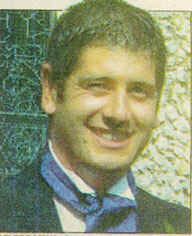Ben Thorn was in the prime of his life. He was fit and healthy, worked as a skipper on a boat and lived in a bachelor pad with three friends.
The 24 year-old, who played drums in a band, had
everything to live for. So when his family was told he had died in his sleep on Sep 28 last year they were shocked.
His mother, Veronica Thorn, said:
“Ben’s death shattered my world. At first I thought he must have been killed in a car accident because he drove quite fast.
“But when the police told me one of his flat-mates found him dead in bed I just didn’t understand. Police initially, wrongly, thought his death may have been drugs related.”
Ben went to bed in his Hove flat on a Thursday night and never woke up.
It was three weeks before the coroner informed his family about how he died. Mrs Thorn, 48, who lives in Littlehampton with her husband, Tony, 49, said: “He told us Ben probably died from long QT syndrome which is a form of the sudden adult death condition.
“I had not heard much about the syndrome but I found out it was an inherited disturbance in the heart’s rhythm.
“The coroner said it was often difficult to detect as there are few signs of it in a dead heart.
“That is why so many deaths are recorded as drownings or accidents.”
Long QT refers to an extra-long pause interrupting heart rhythm.
She described how 6ft 2in Ben was like a gentle giant, was fit and never showed any symptoms of the condition. He had no blackouts, palpitations or sudden fainting spells.
It is estimated hundreds of children and young adults die every year in the UK from sudden adult death. But people often do not know they have it until it is too late.
It is a common cause of sudden death, particularly among young school athletes.
Death can happen while doing exercise but also while the person is asleep.
If detected, it can be managed by drugs including beta-blockers and by avoiding strenuous sports.
Mrs Thorn said Ben, her youngest son, loved skateboarding, cycling and the sea.
He grew up helping his dad Tony with his Skylark Cruises boat business on the River Arun. They planned to buy a new boat together.
Mrs Thorn, an accounts clerk, said: “I always said life’s too short but I didn’t realise it would be so short for Ben. Just when I thought he was in the safest place, in bed, he died.
“My only comfort is that he wasn’t ill and he didn’t suffer.
“His death changed who I am. It has left an enormous gap which I will always try to fill.”
Now Ben’s twin sisters, Paula Mott and Cheryl Seamen, 28, plan to run the London Marathon in April in their brother’s memory.
They hope to raise at least £2,000 for the charity Cardiac Risk in the Young (CRY).
Paula, a cardiac technician at St Richard’s Hospital In Chichester, said: “If Ben was tested for the condition he could have been treated.
“We want to see all children tested for long QT while stiIl at school.
“Children who test positive could be saved through medication
“Corning to terms with Ben’s sudden death has been difficult. You don’t expect your little brother to go to bed and not wake up. I can’t help asking why.’’
She said running the marathon was one of her ambitions and now seemed the perfect time as a tribute to Ben.
A keen runner, she hopes to complete the race in four hours. Cheryl just wants to finish the course.
She said: “Before, when people asked which charity I supported, I never really knew. But now I am determined to raise money to research long QT syndrome. I have started training but need to get a lot fitter.’
She described how one of her last memories of Ben was on her wedding day, six days before he died.
Cheryl, a pharmacy technician at Southlands Hospital in Shoreharn, said: “It was the day after my daughter Jasmine’s first birthday and the kids were running around making lots of noise. Ben was good with all ages but children really loved him.’
She was told of his death while on honeymoon in Fuerteventura.
Paula, Cheryl and brother Gary, 29, are waiting to see if they have inherited long QT syndrome –
Mrs Thorn said: “Ben was everybody’s friend.
He had a calming effect on people and never bore a grudge.
“It is too late for him now but at least we can help others by raising awareness of the condition.”






